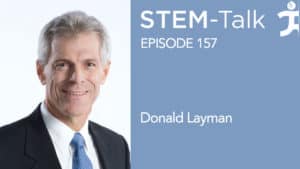STEM-Talk: Don Layman on the role of dietary protein in muscle, health, and disease
Published 9.18.23
Few people know more about muscle development than Dr. Donald Layman.
As the world’s foremost authority on dietary protein and amino acids, he is known for his extensive research on muscle development and his studies of metabolic regulation for obesity, diabetes, and cardiovascular disease.
Layman’s interview with STEM-Talk co-hosts Drs. Ken Ford and Marcas Bamman is now available on IHMC’s website and YouTube as well as in popular podcast apps.

Dr. Donald Layman is an expert on muscle, health, and disease.
“I think everyone knows that our body has a lot of protein in it,” Layman says. “What people don’t realize is we have a constant process of turnover. Every protein in the body has a half-life. Some last an hour or two, some last 30 or 40 days. We have this constant rate of repair and replacement going on. That’s why we need to pay attention to protein turnover. How well we do this process of protein turnover has a lot to do with long term health and aging.”
Layman spent 31 years on the faculty at the University of Illinois Urbana-Champaign, where he is now a professor emeritus. His lab focused on understanding how metabolism works.
Today, he works as Director of Research for the American Egg Board and is a nutrition consultant for the National Dairy Council and The National Cattlemen’s Beef Association. He also is the Chief Science Officer for Qivana, a natural products marketing company that promotes the weight-loss program that Don developed at Illinois.
Our conversation includes:
- How Layman’s small-town childhood fueled his curiosity. “Growing up on a farm makes you curious, makes you wonder how to make things work,” he says. “I was always interested in why things worked, the math and science of it.”
- How life on the farm influenced him. “As a small-town boy whose horizons weren’t that broad, I was willing to go with the flow and figure things out.”
- Discoveries in the late 90s that the showed how important protein is to countering the effects of aging.
- The right amount of protein an individual should consume and mentions that there is much confusion on this issue, largely due to the food pyramid’s recommended daily allowance for protein of 0.8 grams per kilogram of body weight.
- The protein deficit that women experience. Don says 40 percent of women who are 60 and older consume less than the RDA for protein, which is likely the bare minimum. And among women between 16-22, only 20 percent consume the minimum RDA.
- The challenge that vegans face in getting the right amount of protein compared to carnivores and omnivores, largely because the amino acid leucine, which is vital for muscle repair and replacement, and is very low in plant-based foods.
- His 2005 paper titled “Dietary Protein and Exercise Have Additive Effects on Body Composition,” which demonstrated the synergy of protein and exercise.
- What sort of exercise should people do to build muscle after correcting their protein intake.
- The optimal amount of protein people should consume at breakfast and throughout the rest of the day.
And much more.
Latest News
- Scientists passing the torch at IHMC Summer Robotics Camp
- STEM-Talk: Ask Me Anything with Dr. Ken Ford
- David Bear joins IHMC Board of Directors
- STEM-Talk: Michael Schmidt on building a space-faring civilization
- Florida Blue award supports health and wellness research and outreach at IHMC
- STEM-Talk: Ken Forbus on AI and his development of the Structure Mapping Engine
- STEM-Talk: Pascal Lee on returning to the Moon — and heading to Mars
- Aging Symposium draws experts to IHMC
- IHMC hosts Fredric G. Levin Lung Care Symposium March 27-28 in Pensacola

